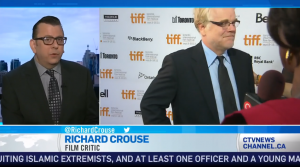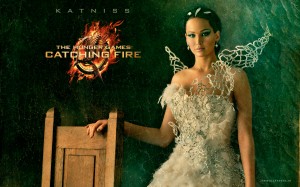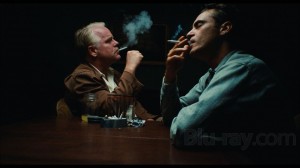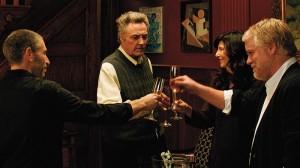Richard looks back at the career of Philip Seymour Hoffman.
 Richard looks back at the career of Phillip Seymour Hoffman with Brad Giffen of CTV’s News Channel.
Richard looks back at the career of Phillip Seymour Hoffman with Brad Giffen of CTV’s News Channel.
Watch the whole thing HERE!
 Richard looks back at the career of Phillip Seymour Hoffman with Brad Giffen of CTV’s News Channel.
Richard looks back at the career of Phillip Seymour Hoffman with Brad Giffen of CTV’s News Channel.
Watch the whole thing HERE!
 Synopsis: Combatants and sweethearts Katniss Everdeen (Jennifer Lawrence) and Peeta Mellark (Josh Hutcherson) have returned victorious from the 74th Annual Hunger Games. While on a Victory Tour to Panem’s various downtrodden districts, revolution is in the air. The people see Katniss as a symbol of freedom, which, of course, doesn’t sit well with President Snow (Donald Sutherland), the country’s autocratic leader. To quell the revolution he and his head gamesmaker (Philip Seymour Hoffman) devise the trickiest Hunger Games yet, the Quarter Quell that will pit former winners against one another in the battle to the death.
Synopsis: Combatants and sweethearts Katniss Everdeen (Jennifer Lawrence) and Peeta Mellark (Josh Hutcherson) have returned victorious from the 74th Annual Hunger Games. While on a Victory Tour to Panem’s various downtrodden districts, revolution is in the air. The people see Katniss as a symbol of freedom, which, of course, doesn’t sit well with President Snow (Donald Sutherland), the country’s autocratic leader. To quell the revolution he and his head gamesmaker (Philip Seymour Hoffman) devise the trickiest Hunger Games yet, the Quarter Quell that will pit former winners against one another in the battle to the death.
• Richard: 4/5
• Mark: 3/5
Richard: Mark, I’m glad I saw the first Hunger Games movie because I’m not sure if I would have a clue as to what was going on if I didn’t have that background. I may have been taken in by the beautiful art direction, or Jennifer Lawrence’s intense performance, but I don’t think I would have been able to connect all the dots. Plot points become more obvious in the second hour, but for non-Hungerites it might be confusing. What did you think?
Mark: I don’t think anyone who didn’t see the first one would even be interested in seeing the second instalment. So the question becomes: how do they compare? And surprisingly, I kind of prefer the sequel. The issues of state control, of media manipulation, and of income disparity are sharper and less cartoonish here. But more important, the secondary characters are more interesting and better drawn. Some of the contestants are intriguing, like Jeffrey Wright’s techno-nerd, and his partner Amanda Plummer, doing her nutso thing. I even liked Elizabeth Banks and Stanley Tucci this time around — the characters seemed more grounded in the story.
RC: I do think this is a better movie than the first instalment. It is set decorated and costumed to within an inch of its life, but nonetheless has a gritty edge. It doesn’t feel like a budget big franchise movie and that’s a good thing. Visually as well as thematically it has more edge than any of the recent Marvel movies. And it skirts around the thing that upset many people about the first movie — the idea of kids killing kids — by setting the action between former victors ranging in age from in their 20s to in their 70s.
MB: You know what else it skirts around? The killings themselves, many of which happen off-screen, to protect the delicate psyches of our tweener population. But that’s OK; this isn’t really a film about body count. The only thing that left me queasy was the cliffhanger ending, with a plot twist that will seem arbitrary until we catch the next instalment.
RC: The cliffhanger ending is a bit of a shock after the almost two-and-a-half hour running time, but I felt as though enough had happened to keep me interested for the next one.
MB: And I think the next one may show Woody Harrelson to be the trilogy’s most valuable player.
 It’s impossible to deny the correlation between “The Master” and the origins of Scientology. No story about a midcentury mystic starting a religion based on sci fi could avoid the comparison, but Tom Cruise and John Travolta needn’t boycott the film. Director Paul Thomas Anderson simply uses the birth of the religion as a backdrop for a study in extreme behavior focusing on two troubled men, Lancaster Dodd (Philip Seymour Hoffman) and Freddie Quell (Joaquin Phoenix).
It’s impossible to deny the correlation between “The Master” and the origins of Scientology. No story about a midcentury mystic starting a religion based on sci fi could avoid the comparison, but Tom Cruise and John Travolta needn’t boycott the film. Director Paul Thomas Anderson simply uses the birth of the religion as a backdrop for a study in extreme behavior focusing on two troubled men, Lancaster Dodd (Philip Seymour Hoffman) and Freddie Quell (Joaquin Phoenix).
Quell, a WWII vet with a taste for gut rot hooch and post traumatic stress disorder drifts through life until he meets Dodd, a self described “writer, doctor, nuclear physicist, theoretical philosopher [and] hopelessly inquisitive man.” Dodd is the godhead of a new movement called The Cause aimed at maximizing human potential. His disciples, who believe his mix of sci fi and religion will rid them of past trauma, call him the Master.
Quell is invited to join the group with the welcome, “leave your worries for a while. They’ll be there when you get back. Your memories aren’t invited.” The bewildered sailor agrees, becoming a pet project for Dodd, who “processes” him to cleanse past lives and free his spirit. What follows is a beautifully choreographed ballet of loyalty, deceit and betrayal with Quell and Dodd taking turns leading the dance.
Giving away too much more isn’t fair to the movie or the viewer. The relationship between the men is complex. It’s doctor-patient, or perhaps father-son, maybe almost oedipal. It’s been suggested that Quell is a Tyler Durden character; that he doesn’t exist except as a manifestation of the rage that Dodd manages to keep in check most of the time. I don’t buy that. They may be two sides of the same coin, but they are definitely two different people.
As Quell Phoenix is a raw twitching nerve, part Brando, part Bukowski. He’s restless, disturbed and feral. The kind of man who enjoys drinking a home brew made from paint thinner, picking fights and crying when he thinks of lost love. Emotionally damaged, he’s unpredictable and Phoenix embodies him. It’s an astonishing, revelatory performance that recalls “Raging Bull” era De Niro.
As untamed as Phoenix is, Hoffman is controlled, handing in a performance brimming with confidence, power and charisma. Imagine Orson Welles as a wannabe prophet and you get the idea. He’s a charlatan with a silver tongue, a true believer who presents his wacko ideas “as a gift to homo sapiens,” and, alongside Phoenix a lock for an Oscar nomination.
The leads are joined by an impressive cast of supporting actors, notably Amy Adams as the steely wife of the Master and Laura Dern as an early disciple.
“The Master” won’t satisfy those who like their stories tied up in neat bows. It is an enigmatic story about impenetrable people; an opaque, singular experience that is best thought of as a tone poem about man’s aspirations and failures.
 Lately we’ve grown used to seeing Christopher Walken in comedic roles—almost veering into self-parody—so it is refreshing to see him not rely on tricks and produce a layered, heartfelt and emotionally rich work. In “A Late Quartet” he delivers his most poignant performance in years.
Lately we’ve grown used to seeing Christopher Walken in comedic roles—almost veering into self-parody—so it is refreshing to see him not rely on tricks and produce a layered, heartfelt and emotionally rich work. In “A Late Quartet” he delivers his most poignant performance in years.
Walken is Peter Mitchell, cellist and senior member of The Fugue, a world famous string quartet. For twenty-fives years and 3000 performances he has helped to define chamber music with first violinist Daniel Lerner (Mark Ivanir), second violinist Robert Gelbart (Philip Seymour Hoffman) and Juliette Gelbart (Catherine Keener) on viola. When Peter is diagnosed with Parkinson’s disease and decides to hang up his cello, the Fugue friends are thrown into turmoil.
Walken’s illness and retirement are the catalyst for the film’s look at how people deal with change, but it also provides the heart. Many of the situations are melodramatic—an affair, an inappropriate romance among them—but it isn’t so much about the events themselves as it is about how change affects people.
Each of the three remaining musicians become different people once they have been cut loose from the watchful eye of their friend and mentor. The overall effect is more interesting than the mechanisms of it. The affair and the plot machinery that keeps the story going are there simply to serve great performances from a powerhouse cast.
Hoffman, Keener, Ivanir and Imogen Poots as Robert and Juliette’s college-age daughter Alexandra are uniformly strong, but the maestro here is Walken.
Subtle, nuanced and heartbreaking, his portrayal of a man confronting old age and an uncertain future is first class, a virtuoso turn.
“A Late Quartet” could have been a downer film about classical music and mortality, but instead it’s funny, melancholy and touching.